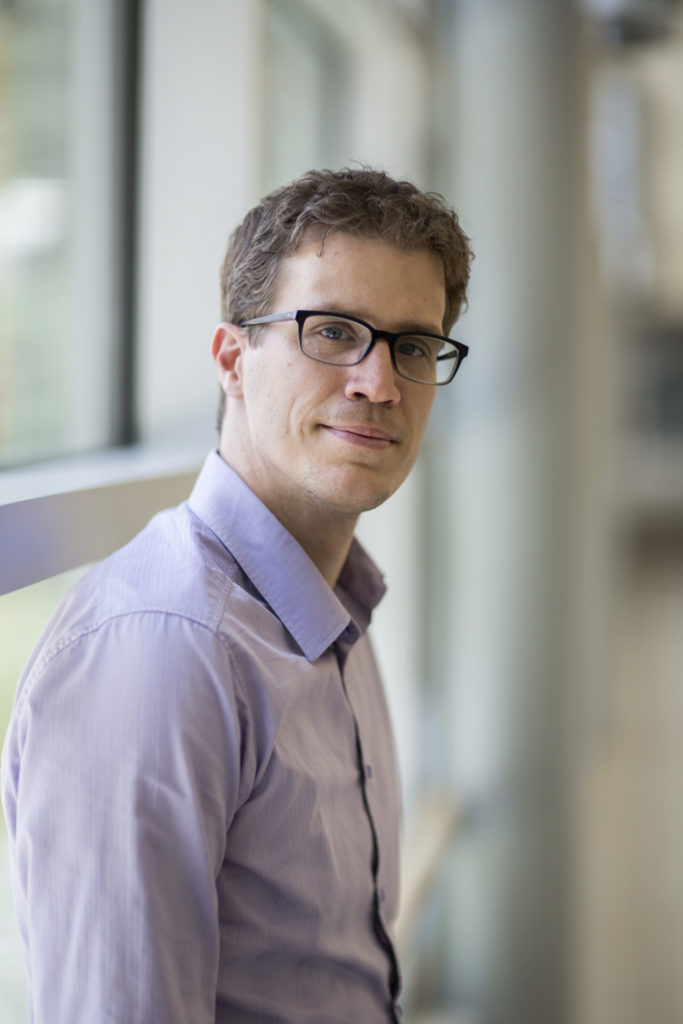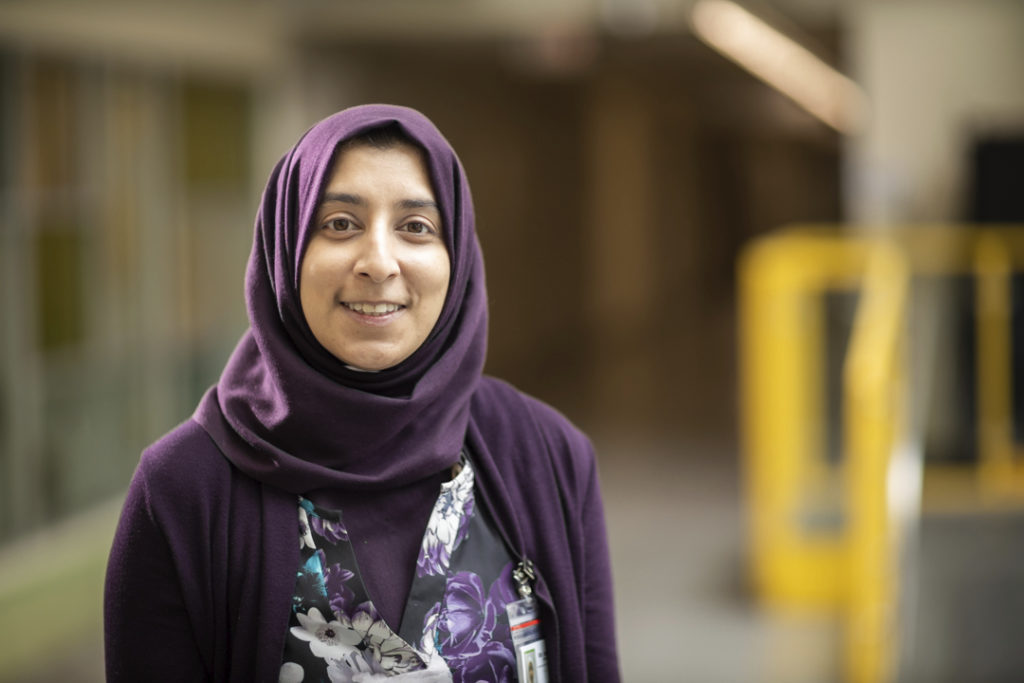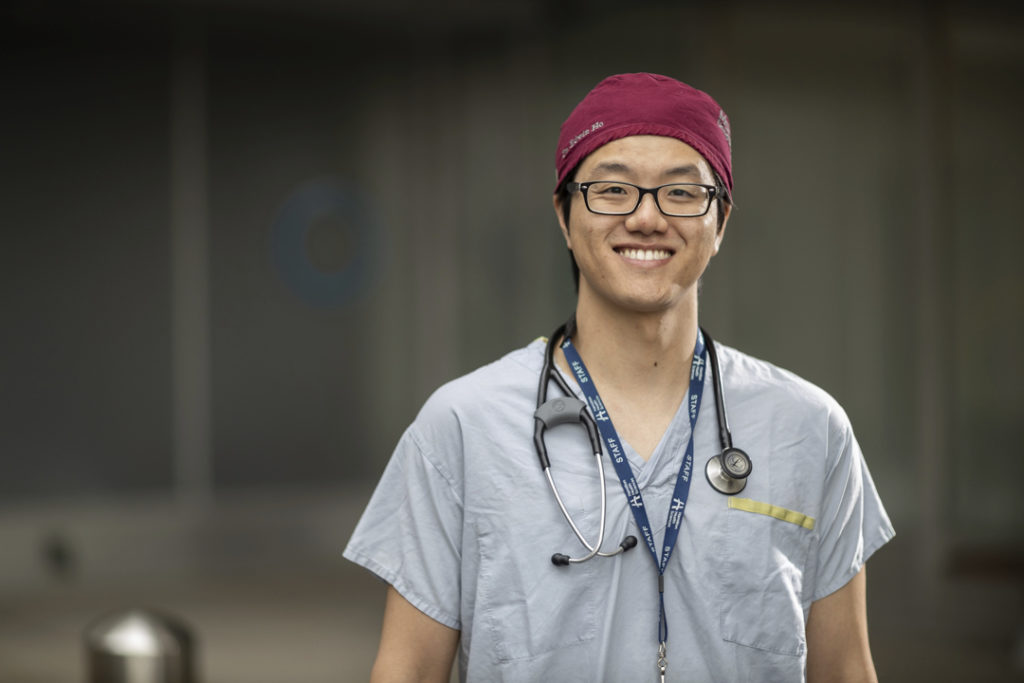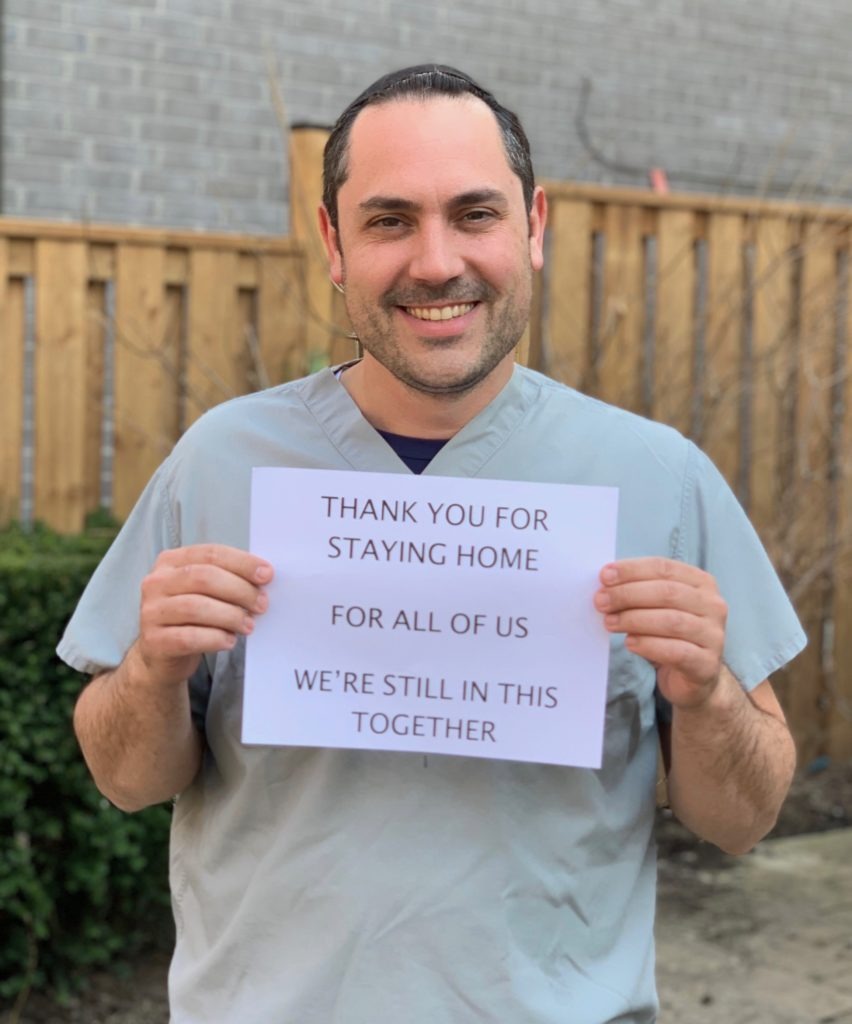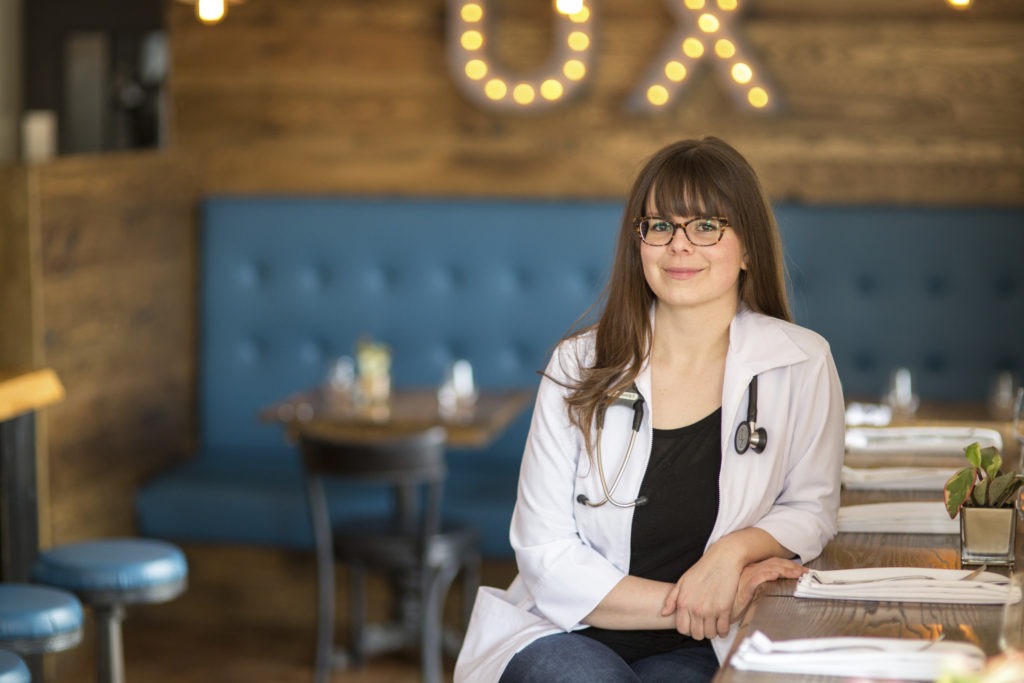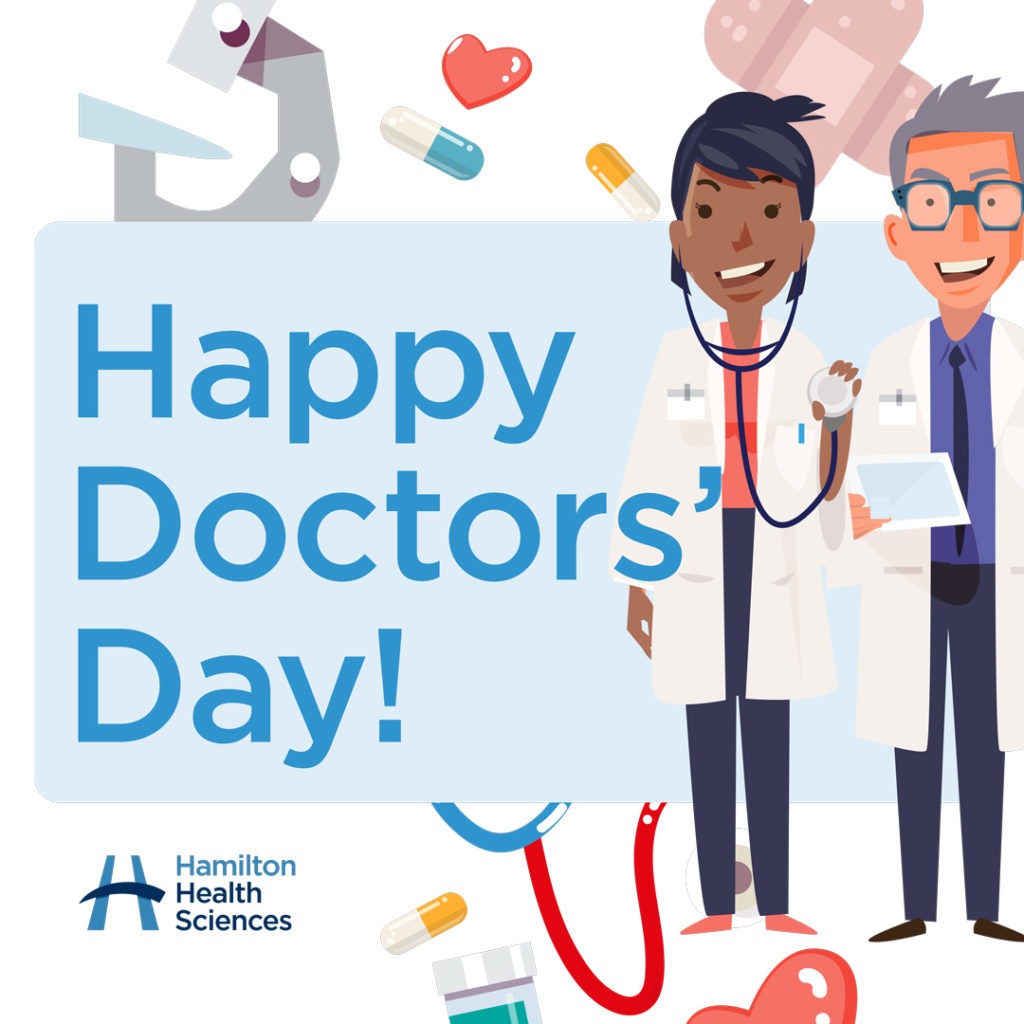
Celebrating Doctor’s Day 2020
May 1 is Doctors’ Day in Ontario. Hamilton Health Sciences takes this opportunity to celebrate the exceptional leadership our doctors bring to our hospital and the exemplary care they provide to our patients, families and community.
During the COVID-19 pandemic, our doctors have stepped up in countless ways, providing support, expertise and compassion to their colleagues and patients alike.
We asked some of our doctors to share their most memorable moments over the last few weeks taking part in our response to this pandemic. Each story is a deeply personal and poignant look at being a doctor in a time of unprecedented change.
Dr. Dominik Mertz, Medical Director of Infection Prevention and Control
To date, what image, experience, exchange, discussion, memory or moment has been most impactful for you during this pandemic?
Challenges like this can bring people together, and I noticed formations of strong groups with amazing productivity, as well as me developing great connections to people I would only marginally have had interactions with in the past.
What would you say is your greatest contribution to HHS’ COVID-19 preparations and response?
In a perfect world, evidence should be driving decisions. Lack of evidence results in sometimes unresolvable disagreements and opinion-based decisions. I always give my best to guide the decision-making process to be as evidence-based as possible and to ground people in (ethical) principles to guide the process to make sure decisions are supporting the intent they should serve.
What’s one piece of advice you would give to future doctors on how to prepare themselves to work in a pandemic?
Be honest, transparent, open minded and respectful of other opinions. Lead by example. Also know when to pick a fight, and when not to.
Dr. Sarah Khan, Associate Medical Director of Infection Prevention and Control
What would you say is your greatest contribution to HHS’ COVID-19 preparations and response?
Being able to provide advice to colleagues, support to frontline staff, and input to policy development so we can make evidence-informed, rational decisions together in an era where data is limited, resources are heavily strained, and emotions are heightened.
To date, what image, experience, exchange, discussion, memory or moment has been most impactful for you during this pandemic?
Hearing about front line workers efforts who serve their community, patients and colleagues in this time of uncertainty. Front line workers who quarantined from their own families out of abundance of caution, staff who volunteered for re-deployment to high-risk areas out of their comfort zone as they wanted to fight the good fight, and seeing the community rally together to keep each other safe. It brings tears to my eyes to see how peoples’ humanity is revealed rather than the anxiety and fear overwhelm us.
What’s one piece of advice you would give to future doctors on how to prepare themselves to work in a pandemic?
Stay calm, reflect on your actions and decisions, do not act in haste. You may not have a guide to follow, look to those who came before you for advice. Don’t bend to or follow guidance that doesn’t make sense, as it will change within hours once it hits the ground. Common sense may not always be common, but try your best to be rational in your decisions and choices. Work together, even when there are strong differences in opinion, as only together can we get through these challenging times.
Dr. Edwin K.T. Ho, Staff Anesthesiologist, Hamilton Health Sciences, Anesthesia Site Chief, Juravinski Hospital
What would you say is your greatest contribution to HHS’ COVID-19 preparations and response?
I am proud to be part of the 24/7 Anesthesia Rapid Response Team (ARRT) which was specifically created as part of HHS’ pandemic response. This team, also composed of a highly skilled nurse and respiratory therapist, recognizes the unique skill set of anesthesiologists as the experts in airway management. We respond to any COVID-suspected or positive patient in the hospital requiring airway intervention and/or resuscitation. Intubation—putting a tube down someone’s windpipe to help them breathe—is perhaps the most dangerous procedure we are doing during this pandemic. You have one chance to get it right and any delay puts the patient already in respiratory distress at greater risk and can also cause the entire room to be contaminated with the virus. This specialized team optimizes care for patients, conserves protective equipment and minimizes risk to other medical staff. I am extremely proud of my anesthesia colleagues on the team as well as those staying in the operating room to ensure patients requiring urgent surgeries continue to get cared for.
To date, what image, experience, exchange, discussion, memory or moment has been most impactful for you during this pandemic?
I remember a frail patient being brought into the operating room for an emergency surgery at the beginning of the pandemic. She was transferred over to the operating table and was quickly surrounded in a semi-circle by various doctors and nurses getting her ready for surgery. Everyone was in full protective gear including a N95 mask, face shield, head cover and gown. I couldn’t even recognize my own colleagues under all the layers of protection. It must have been terrifying for the patient. Before I put her to sleep, I asked her if she had any questions and I remember her exact words, “Thank you everyone for everything. I can only see all your eyes, they all look so stressed. I know I will be fine, and I know you will all be fine. Have a little faith.” It was such a humbling experience being reassured by a patient who had every reason to be scared speechless. I would like to think it was our excellent care that got her through the surgery but I was reminded that a little faith also goes a long way.
What’s one piece of advice you would give to future doctors on how to prepare themselves to work in a pandemic?
This pandemic has brought along a staggering amount of new information, guidelines and policies. Once you have it figured out, it all changes again. It can be disorienting and discouraging. The piece of advice I would give to future doctors is to learn to be adaptable but at the end of the day, you need to know your basic medicine. Build that core foundation and then trust your training and the instincts you’re going to hone over countless sleepless nights. Also, let’s pair the basics of medicine with basic manners. Be thankful and respectful to everyone; not only the front-line workers such as your physician colleagues and nurses but also to the behind-the-scenes services and individuals who keep the hospital running smoothly every day. Basic medicine and basic manners will ensure a long medical career, pandemic or not.
Dr. Ari Greenwald, Emergency Physician
What would you say is your greatest contribution to HHS’ COVID-19 preparations and response?
Following several overnight shifts at HHS in mid-March before social distancing was widely practiced or advised and before asymptomatic spread of COVID-19 was widely discussed, I strongly advocated for immediate self-isolation and physical distancing measures through a recorded message to my Jewish community. This message was shared on social media and rapidly spread throughout the worldwide Jewish community and the broader medical community. Within days, it was turned into a YouTube video that received over 750,000 views.
I strongly believe that the power of that message came from the people who heard it and sent it on to people they cared about. The fact that it resonated with so many people around the world at a pivotal time in the COVID-19 pandemic is representative of the power of caring for one another.
To date, what image, experience, exchange, discussion, memory or moment has been most impactful for you during this pandemic?
During an overnight shift, a patient came in quite sick. She had a diagnosis of cancer, and she was so weak that she could barely speak. After we all donned appropriate PPE, the great team of nurses moved quickly to begin resuscitative measures and initial investigations. During this process, I took my phone into the room and called the patient’s husband. He answered immediately, and I asked if he could join us on a video call. Within a minute, his voice and his real-time image was in the room with us. Reviewing his wife’s history. Her goals of care. Speaking to his wife. Getting up to the minute updates. And easing his wife’s anxiety and his own fears, while our team did its work. Her husband remained on speakerphone with his wife and the team throughout the night as she slowly regained consciousness and improved.
For me, the ability to virtually connect with a patient’s family during times of intense uncertainly, anxiety, fear, and vulnerability, made all the difference. Ultimately, what this demonstrated to me is the importance of enabling virtual connectivity for our patients and their families despite physical distancing measures and ‘no patient visitor’ policies that are affecting everyone.
What’s one piece of advice you would give to future doctors on how to prepare themselves to work in a pandemic?
Perfect is the enemy of good in these situations. If we wait for the perfect solution to the proven problem, we lose. You must act fast. You must react to and be proactive against the problems you and your colleagues know to be real. And your solutions must be good enough, with the option to pivot and adjust as the reality on the ground changes. In the first few weeks, the reality we were facing and living was changing almost day-to-day and hour-to-hour. Most successful initiatives, especially during the initial phases of this pandemic, relied on grassroots initiatives, small teams comprised of passionate members, and an out-of-the-box all-hands-on-deck way of thinking.
Dr. Emilie Belley-Cote, Cardiologist, Research fellow – Population Health Research Institute
What would you say is your greatest contribution to HHS’ COVID-19 preparations and response?
I have worked with colleagues from the Population Health Research Institute to develop a randomized trial platform that will allow us to evaluate whether various therapies can prevent the progression of COVID-19.
To date, what image, experience, exchange, discussion, memory or moment has been most impactful for you during this pandemic?
I will never forget how a large group of researchers dropped everything they were working on and got together (virtually) to conceptualize this trial and then to make it happen. It would not have been possible to accomplish all of that work in such a short period of time without this collective effort.
What’s one piece of advice you would give to future doctors on how to prepare themselves to work in a pandemic?
Be ready to work as part of a team!

